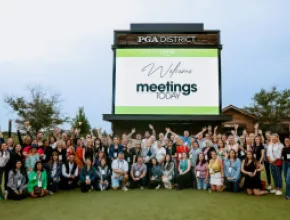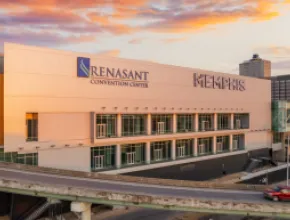PCMA set an attendance record at its 52nd Annual Meeting held Jan. 13-16 in Seattle, with an unaudited total of more than 3,400 attendees.
“It isn’t all about records, though,” said PCMA President and CEO Deborah Sexton, “it’s about the quality of education and the experience our members have while in Seattle….Our goal is to continue to raise the bar to be as current as we can with education. We’re not all about numbers. Our aspiration is not to be the biggest organization in the industry; our goal is to be the organization with the highest level of leadership in the industry.”
Sexton said the Annual Meeting also set a record for student attendance, at 237.
Sexton estimated that the attendee mix was 60 percent supplier and 40 percent meeting planer. Exact figures will be available roughly 10 days following the close of the convention.
Although the Seattle convention didn’t match PCMA’s 2007 Annual Meeting in Toronto as being a “zero-waste” event, the association and the Washington State Convention and Trade Center (WSCTC) undertook a wide variety of green initiatives for the show.
Major environmentally responsible aspects of the convention included the following:
To reduce plastic waste, individual bottled water was not served--all attendees were provided with a reusable water bottle to fill at several water stations located throughout the WSCTC.
The 2008 registration bags, produced by BrandAdvantage, were made from organic jute and recycled nylon. Extra/unwanted bags will be donated to a local charitable organization.
All trash cans in the PCMA meeting space were removed and replaced with recycle bins.
All PCMA Annual Meeting printed material was printed/copied on post-consumer recycled paper.
· Print on Demand stations for handouts reduced the paper waste in the concurrent sessions.
· Plastic name badges and Expocards were being collected and recycled.
All excess food will be donated to a local food rescue program.
Food preparation focused on locally grown produce and featured some organic food items free of environment-harming pesticides.
PCMA’s partners were encouraged to print on recycled paper and to print and ship a reduced quantity of marketing collateral and amenities to reduce waste.
· PCMA collected and stored any unused/excess partner collateral as inventory for future events, thus reducing future print requirements. If partner collateral is not reusable, PCMA said it will recycle it.
According to PCMA, green tactics that have been implemented by the WSCTC include:
· An overhaul of the Center’s lighting system was conducted to replace outdated equipment with new and more-efficient fixtures.
· New touchless faucets and self-flushing toilets were installed to reduce water consumption.
· The WSCTC recycling program recycles paper, wood, metal and plastic products. As a result of the recycling initiative, the WSCTC has recycled: 174 tons of cardboard; 2,460 lbs of aluminum cans or 79,200 individual pop cans; 186 tons of mixed paper, plastic and glass recycled; 12 tons of scrap metal were recycled; an estimated 8,000 wood pallets were shipped to the WSCTC and sent back with the shipper to be reused; all computers and office machines that are updated are recycled; all spent fluorescent bulbs and ballasts are recycled; all spent AA, AAA and 9V batteries are recycled; 3,328 gallons of kitchen grease was recycled and reused by a rendering plant; and 23,968 meals were sent to local charities this past year.
· The WSCTC also partnered with a local company to recycle PCMA meeting banners.
While Seattle, and the Pacific Northwest in general, is considered a leader in the green meetings movement, Sexton said planners should expect a similar level of “greening” at the two upcoming Annual Meetings, held next year in New Orleans and in Dallas in 2010.
“I don’t see any [green meeting] disadvantages of meeting in New Orleans and Dallas,” she stressed. “We don’t own greening—or social responsibility—no organization owns that.”
Sexton said that PCMA will explore a variety of community-building programs for the New Orleans convention.
“There is nothing in place yet, but we’re working on it,” Sexton said. “There will be any number of projects. People are asking if they can come [early to the Annual Meeting] on Friday and Saturday to work on it. We’re taking a look at if there is a way to elongate [the convention] for our members. We don’t push it, because as soon as we announce it, the 150 spaces fill up.”
In other PCMA news, the association said it added 576 new members in 2007, and also used the 2008 annual meeting to showcase its re-tooled website.





